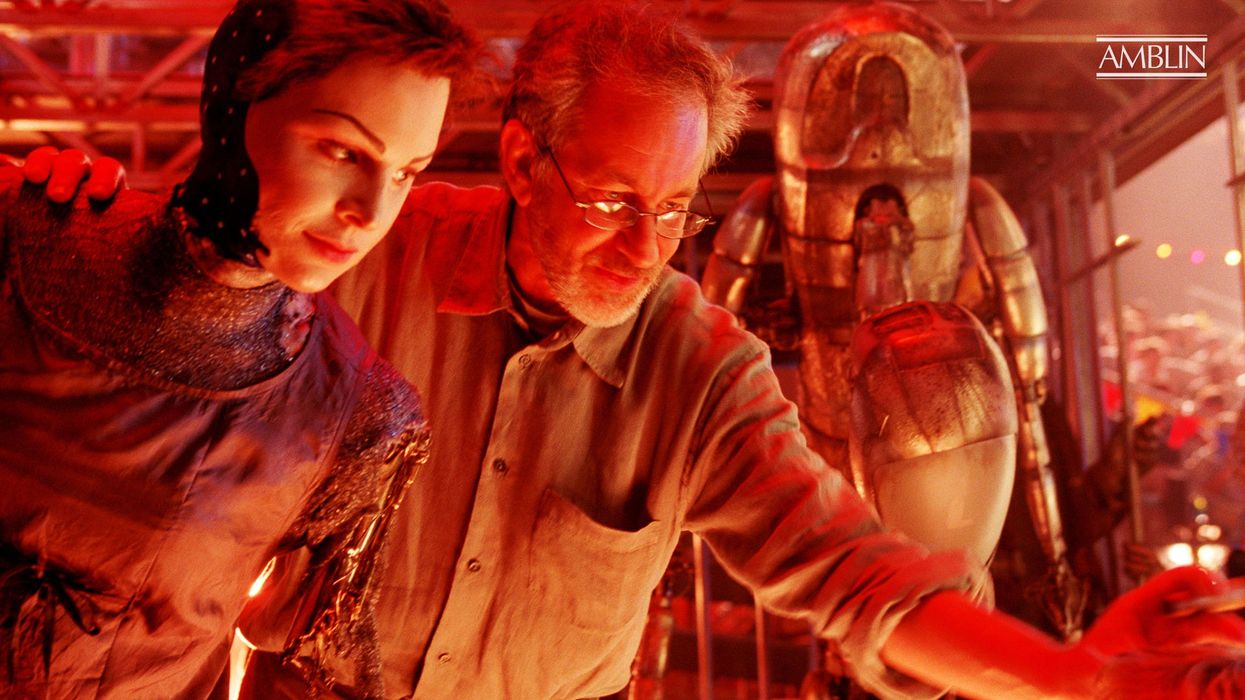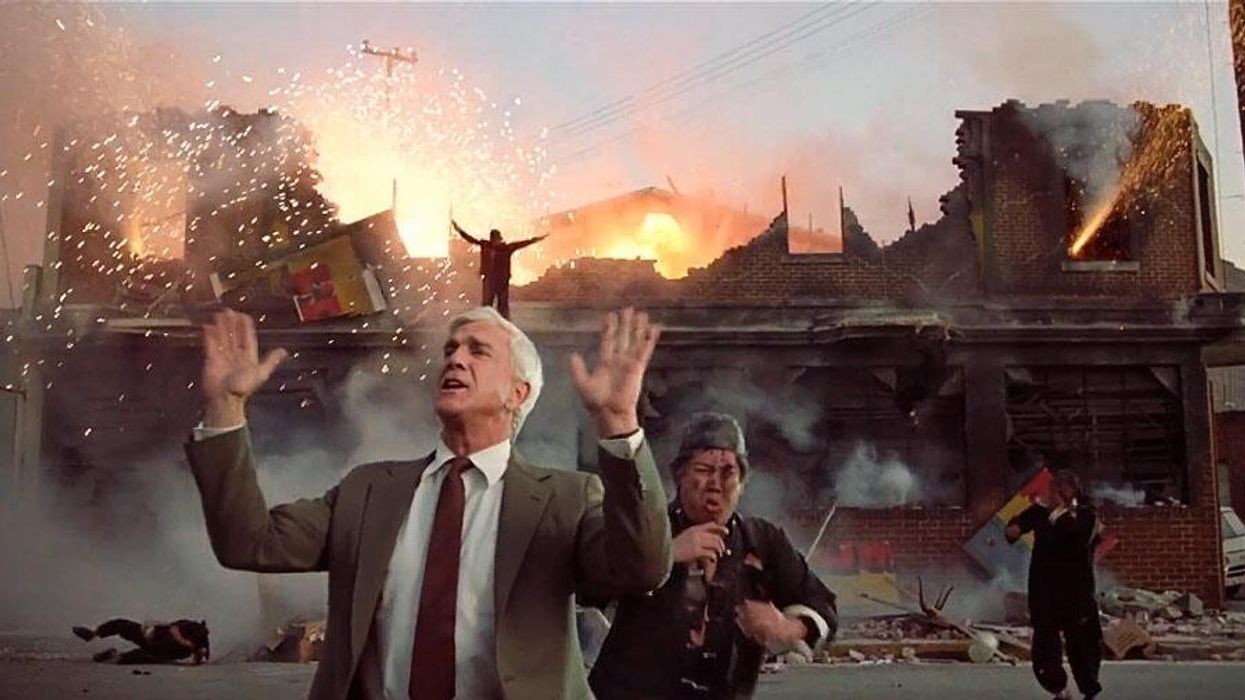The Meaning of the Ending of Steven Spielberg's 'A.I. Artificial Intelligence'
Steven Spielberg is the king of audience manipulation, but how does he play with that at the end of Artificial Intelligence?

It's hard to imagine two directors with as different of personas as Steven Spielberg and Stanley Kubrick. One was a control freak obsessed with the details, the other is a dreamer obsessed with the audience. You might already know this, but the two of them were actually close friends. They shared an admiration for one another's work and frequently communicated ideas.
Eventually, this friendship would lead Spielberg to make one of his most daring films, subverting everything we know about him and his stylistic nature and storytelling tendencies.
The idea for A.I. Artificial Intelligence came from Brian Aldiss’s short story, “Supertoys Last All Summer Long.” Kubrick loved the idea of making a story about a boy who could never please his mother, but the more he worked on it over the decades, the more he thought he wasn't the person to tell the story. He knew it had to be his friend Spielberg.
Spielberg himself remained unconvinced but loved looking at some of the concept art and story docs Kubrick had made. Kubrick's tragic death at the end of the 90s left Spielberg searching for his next project. After some searching, he knew the way to honor his friend was to heed his advice and set off on a journey that would challenge himself.
A few years later, on June 29, 2001, A.I. Artificial Intelligence hit cinemas. It was an enigmatic look at human nature as seen through the eyes of a non-human. There's a lot to talk about when it comes to this film, but what many people focus on is that enigmatic ending.
After the movie's release, critics everywhere were not sure what to make of the film. It was like Spielberg had channeled Kubrick and subverted everyone's expectations. Roger Ebert described the movie as "wonderful and maddening."
In the rare form of applause, critic Armond White said, "each part of David's journey through carnal and sexual universes into the final eschatological devastation becomes as profoundly philosophical and contemplative as anything by cinema's most thoughtful, speculative artists—Borzage, Ozu, Demy, Tarkovsky."
But the ending is what's stood the test of time, pun intended, and what we will focus on today.
What Happens at the End of A.I. Artificial Intelligence?
For those of you who forget the end of the movie, I'll get you up to speed quickly. David is a robot boy who gets discarded by his parents when their biological son recovers from an illness. Forced to fend for himself, he wanders in the real world, befriending a gigolo robot named Joe. After being taken by a flesh farm and escaping, David finds his creator in a mostly submerged New York. After finding out he is one of many David-style robots, he realizes he will never be a real boy, becomes depressed, and tries to kill himself.
While underwater, he thinks he sees a fairy and swims toward her (with the help of some fish), but before he can get there, Joe saves him. Joe is then captured by authorities set to take robots off the street, but before that happens, he programs their vehicle to hide David under the water. David and Teddy get trapped underwater in a vehicle after hitting an old piece of the Coney Island Ferris Wheel. David just sits there and begs the fairy (a Coney Island attraction) to be made into a real boy until his battery dies.
We flash forward 2,000 years into the future, and all of humanity is extinct. Manhattan is buried under the ice. Creatures show up, dust David off, and revive him. David can communicate with these creatures, who are singularity-achieved robots called Mecha, and they grant David's one wish by reconstructing his family home from David's memories. They then use an interactive image of the fairy to talk with David. They tell him they can't make him into a real boy, but David insists they use their knowledge to recreate his lost mother through genetic material from the strand of hair he had. The creatures appease David, making a Mom clone that can only live for one day.
That way, when David wakes in the morning, he spends his happiest day, and at night she tells him he is loved. The narrator of the movie says David gets "the everlasting moment he had been waiting for." Then, "David falls asleep as well and goes to that place 'where dreams are born.'"
David shuts down, finally completing his mission.
The Meaning of the Ending of Steven Spielberg's A.I. Artificial Intelligence
First, I am in the camp that the Mecha creatures David meets are robots that have continued to advance long after the disappearance of humans, not aliens. I respect the people who theorize they are aliens. Their fascination with him has to be like the human fascination with fossils. These creatures try to make David's wish come true out of fascination and a desire to study him. Maybe their processor has found some emotions they can replicate as well.
At the end of the day, David was a computer that needed to fulfill a directive—get a mother's love. The film finished with his Mom clone (it also could be a hologram or mental projection) hugging him and telling him he is loved. Once David's directive of love has been reached, he goes to sleep, or shuts down, finally having the pain of not being able to please his mother subside. David is effectively put out of his misery.
So what does it mean?
I think it's interesting to see a time jump 2,000 years, projecting David as almost a god-like creature to the Mecha. He was an object touched by their creators, who have long been gone. There's some level of cynicism here, as they seek to basically put David out of his misery, and complete a directive his programming has been longing to finish.
But I wonder if the movie has a basic concept of the idea that if we were building a human being, central to that experience would be the need to get and give love. Even after thousands of years and the extinction of humans, love is at the center of what we tried to impart to the robots.
Even though the Mecha fulfill David's fantasy, I'm not sure we could see that as them learning to love or be compassionate. I think it's probably closer to computers wanting something to fulfill their programming. But they understand what love is. That's how they know to build that clone or projection of his mother for him. It puts him at ease and lets him find rest.
What Does Steven Spielberg Have to Say About the Ending of A.I. Artificial Intelligence?
In this clip, Spielberg talks about how many critics assumed he was the one who added the Mecha in the end, but that was actually Kubrick's idea and is direct from his treatment.
Spielberg shrugs this off, saying he felt he was obligated to take the movie there for Kubrick, but also for what he cared about.
It's interesting to think about how we view Spielberg and Kubrick, and who is cold and warm. The truth is, there's more to different filmmakers than we see on screen all the time. I know that the movie became the perfect marriage of two visions. Spielberg was able to use Kubrick's notes, but I think the movie that got made is essentially Spielberg.
He lampoons his own Spielberg shot at the end of the movie to dolly in on a face of wonderment, but it's one of a robotic child who has powered down. This sort of subversion of who he is was the right recipe for him to reformat his directing career in 2001. It's almost as if Kubrick knew that the key to Spielberg's later directing career would be confronting who he was in the past. I'm glad he encouraged him to do this movie, and I'm glad we have this ending to debate forever.
Let me know what you think in the comments.











